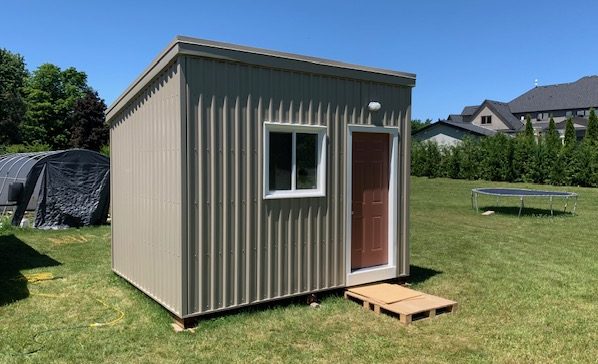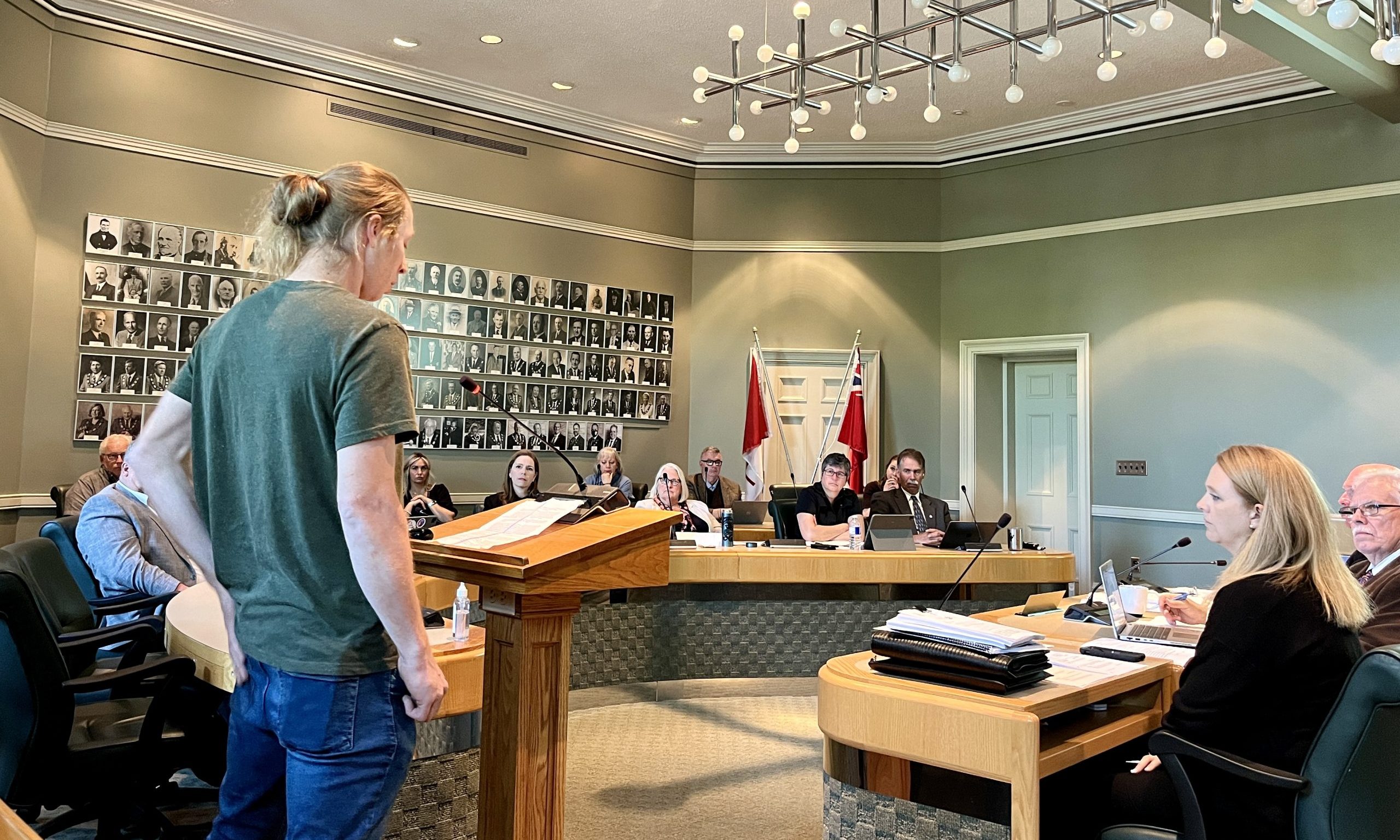GUELPH – Save for public servants, a reporter or two, and the occasional resident, the public gallery in Wellington County’s council chamber often sits empty.
Not so at last week’s meeting of the Wellington-Guelph social services committee.
Several local interest groups, community organizations and concerned residents turned out to support the Guelph Tiny Homes Coalition, which seeks to get a tiny home community of up to 50 units built by winter.
Homelessness is most prevalent in Guelph’s downtown, but the county will likely have a role to play as the provincially-appointed middleman for administering social services – including Ontario Works, childcare and social housing – for both the city and county.
Liz Hales and Mike Marcolongo of the coalition stood before the joint committee, consisting of city and county politicians, and touched on three asks of the county in the group’s mission.
The requests include use of the county’s list of chronically homeless people, permitting shelter allowance dollars from the Ontario Disability Support Program and Ontario Works toward a tiny home, and bringing the proposed tiny home encampment into the county’s continuum of housing options.
The city has been asked to provide land, fast-track zoning approvals, provide services such as garbage pickup, and provide financial support.
Hales and Marcolongo pitched the pilot concept as an efficient, cost-effective way to fill a gap in the county’s housing continuum between emergency shelters and transitional/supportive housing.
“We strongly believe that nobody should be sleeping in a tent,” Marcolongo said.
Hales said the tiny home encampment would be supported by two to three volunteers and staff around the clock.
Annual operational funding is estimated at $500,000, which the coalition is asking Guelph to cover.
“There isn’t anything like what we’re proposing … to offer a place for people to stabilize, for people to build skill and capacity,” Hales said.
A single unit can be built for between $25,000 and $32,000, according to Marcolongo.
The units are designed with steel siding, fire-retardant materials, spray foam insulation between walls, enough height to stand in, a window, and locking metal doors.
The committee heard emotional first- and second-hand anecdotes from Guelph residents about experiences with homelessness and at a structured tiny home community in Kitchener known as A Better Tent City.
“I believe if you want to start to solve this multi-faceted problem, the people need to be provided with food, shelter and a safe place,” said Tamara Williams, whose 34-year-old son now lives at A Better Tent City following many years of living rough.

The Guelph Tiny Homes Coalition wants to install up to 50 tiny homes in Guelph, similar to the one above, to address the housing and homelessness crisis in the city. This tiny home was built by Allen Remley of Remley Homes in Puslinch. Submitted photo
Guelph resident Julie Porter told the committee “tiny homes effectively disrupt the issue of homelessness.”
Officials from Guelph General Hospital (GGH), Canadian Mental Health Association (CMHA) Waterloo Wellington, Stonehenge Therapeutic Community, and Guelph Community Health Centre also spoke in support of the tiny home concept.
CMHA CEO Helen Fishburn said the “one, united health team” fully supports the model.
Guelph Community Health Centre CEO Melissa Kwiatkowski said without housing there isn’t stability.
Even as the county brings on additional supportive shelter options, she expects around 100 people to be left without options.
“We need to start somewhere,” GGH CEO Mark Walton said. “There is a collective will to do something.”
Anyone expecting something revelatory to come out of the meeting was left disappointed.
The committee was presented with a report following a “mayoral direction” by Guelph Mayor Cam Guthrie in May that tasked city staff with exploring options for the proposed encampment.
Among other considerations, Guelph staff looked at city parks for land options and pegged the startup cost of the encampment at $2.5 million.
“Staff do not recommend taking any further action on the provision of a temporary structured encampment site,” the city’s report stated, noting it’s beyond the city’s scope and would create “additional budget pressures.”
The coalition hasn’t raised capital funds for the project. That would come after land is found – another challenge for the group.
They’re seeking a serviced area between 0.8 and 2 acres in size on the periphery of Guelph’s core, where the encampment wouldn’t conflict with neighbours.
The joint committee was also presented with resolutions from Guelph council calling on the county to “determine the viability and suitability” of the tiny home proposal and present an alternative to the city, should the county determine the encampment isn’t viable – and to get it all done before July.
“We’ll be able to make our comments known following our review,” county CAO Scott Wilson told the committee, noting staff on both sides are already talking.
Warden Andy Lennox called on Guelph to make it explicitly clear if it even wants the encampment. The warden also suggested the county may be able to respond with the housing options it has now.
Marcolongo pushed back on the warden, saying the way the county is addressing homelessness won’t solve it.
“If there wasn’t a need for it, folks would be using the shelter system, or there would be enough transitional housing spaces,” Marcolongo told the Advertiser. The end goal is permanent, supportive housing, he said.
“The reality is, there isn’t enough coming online fast enough to address the housing crisis.”



